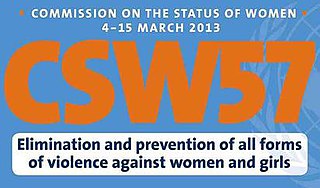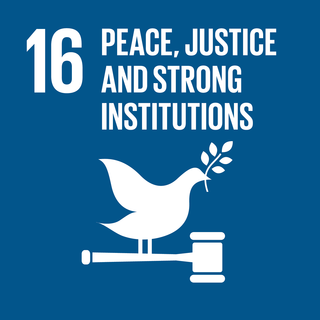
{{Distinguish|text=the term "displaced person", which may include both internally displaced persons and [[refugee]
United Nations Security Council Resolution 1325 (S/RES/1325), on women, peace, and security, was adopted unanimously by the UN Security Council on 31 October 2000, after recalling resolutions 1261 (1999), 1265 (1999), 1296 (2000), and 1314 (2000). The resolution acknowledged the disproportionate and unique impact of armed conflict on women and girls. It calls for the adoption of a gender perspective to consider the special needs of women and girls during conflict, repatriation and resettlement, rehabilitation, reintegration, and post-conflict reconstruction.

The Fourth World Conference on Women: Action for Equality, Development and Peace was the name given for a conference convened by the United Nations during 4–15 September 1995 in Beijing, China.
The International Federation for Human Rights is a non-governmental federation for human rights organizations. Founded in 1922, FIDH is the second oldest international human rights organisation worldwide after Anti-Slavery International. As of 2016, the organization is made up of 184 member organisations including Ligue des droits de l'homme in over 100 countries.

United Nations Security Council Resolution 1612, adopted unanimously on 26 July 2005, after recalling resolutions 1261 (1999), 1308 (2000), 1314 (2000), 1325 (2000), 1379 (2001), 1460 (2003) and 1539 (2004), the Council established a monitoring and reporting mechanism on the use of child soldiers.

The United Nations Department of Economic and Social Affairs is part of the United Nations Secretariat and is responsible for the follow-up to major United Nations Summits and Conferences, as well as services to the United Nations Economic and Social Council and the Second and Third Committees of the United Nations General Assembly. UN DESA assists countries around the world in agenda-setting and decision-making with the goal of meeting their economic, social and environmental challenges. It supports international cooperation to promote sustainable development for all, having as a foundation the 2030 Agenda for Sustainable Development and the 17 Sustainable Development Goals (SDGs) as adopted by the UN General Assembly on 25 September 2015. In providing a broad range of analytical products, policy advice, and technical assistance, UN DESA effectively translates global commitments in the economic, social and environmental spheres into national policies and actions and continues to play a key role in monitoring progress towards internationally agreed-upon development goals. It is also a member of the United Nations Development Group.

The Global Partnership for the Prevention of Armed Conflict (GPPAC) is a member-led network of civil society organisations (CSOs) active in the field of conflict prevention and peacebuilding across the world. The network is organised around 15 regional networks of local organisations, each region having its own priorities, character and agenda. Each region is represented in an International Steering Group, which determines joint global priorities and actions. GPPAC was initiated through extensive consultations in 2003-4, and officially launched as part of a global conference in 2005 at the UN headquarters in New York.
The UNESCO World Water Assessment Programme was founded in 2000 in response to a call from the UN Commission on Sustainable Development (CSD) to produce a UN system-wide periodic global overview of the status, use and management of freshwater resources. To meet this challenge, WWAP coordinates the work of 31 UN-Water members and international partners under the umbrella mechanism of UN-Water, in the production of the World Water Development Report (WWDR). The WWDR is the UN flagship report on water issues; it is a comprehensive review, released every year with a different focus on different strategic water issues, that gives an overall picture of the state, use and management of the world’s freshwater resources and aims to provide decision-makers with tools to formulate and implement sustainable water policies.

United Nations Security Council Resolution 1933, adopted unanimously on June 30, 2010, after reaffirming resolutions 1893 (2009), 1911 (2010) and 1924 (2010) on the situation in Côte d'Ivoire and Resolution 1885 (2009) on the situation in Liberia, the Council extended the mandate of the United Nations Operation in Côte d'Ivoire (UNOCI) and supporting French forces until December 31, 2010 and expanded UNOCI's mandate with provisions to strengthen its capacity to consolidate stability in the country.

UNICEF Indonesia is one of over 190 national offices of the United Nations Children’s Fund. As one of the first UNICEF offices established in Asia, UNICEF Indonesia has been on the ground since 1948 to uphold the rights of children in the vast archipelago, including their right to an education, healthcare and protection from abuse and exploitation. It also advocates for political change in support of children, and works with partner organizations from the public, charity and private sectors, to effect change.

United Nations Security Council resolution 1539, adopted unanimously on 22 April 2004, after recalling resolutions 1261 (1999), 1308 (2000), 1314 (2000), 1325 (2000), 1379 (2001) and 1460 (2003), the Council condemned the use of child soldiers and asked the Secretary-General to devise a monitoring mechanism.

United Nations Security Council Resolution 1998, adopted unanimously on July 12, 2011, after reaffirming resolutions 1261 (1999), 1314 (2000), 1379 (2001), 1460 (2003), 1539 (2004), 1612 (2005) and 1882 (2009) on the protection of children in armed conflict, the Council declared schools and hospitals off limits for both armed groups and military activities, asking the Secretary-General for such crimes to be placed on a list of those committing "grave violations" against children.

The Expert Group Meeting (EGM): prevention of violence against women and girls was convened as part of the United Nations Commission on the Status of Women's multi-year programme of work for 2010-2014. The "Elimination and prevention of all forms of violence against women and girls" forms a priority theme for its fifty-seventh session in 2013 (CSW57). The meeting took place in Bangkok, Thailand 17–20 September 2012 and was organised by the United Nations Entity for Gender Equality and the Empowerment of Women, in collaboration with the following organisations:
Colombia has been in the throes of civil unrest for over half a century. Between 1964 and now, 3 million persons have been displaced and about 220,000 have died, 4 out of 5 deaths were non-combatant civilians. Between left and right-winged armed forces, paramilitary and/or guerrilla, and an often corrupt government, it has been difficult for Colombia to set up any kind of truth or reconciliation commission. That is why the first on the scene, so to speak, were representatives of the UN. The Office of the United Nations High Commissioner for Human Rights has been present in Colombia since 1997. Since 2006 though, there has been another international movement turning its attention to Colombia; namely the International Center for Transitional Justice (ICTJ). The works of both of these institutions have led to a few semi-official national committees to oversee truth seeking missions in the hopes of eventually achieving reparation. In 2012, the Colombian government and the Revolutionary Armed Forces of Colombia (FARC) began their fourth attempt to negotiate an end to the fighting. Peace talks between the Colombian government of Juan Manuel Santos and the FARC, the main guerrilla force in the country, are currently underway in Havana, Cuba. The main issues are land redistribution, integration of the FARC into the political arena and an end to the powerful cocaine cartels. Though past attempts at peace talks have failed, negotiators in Havana, Cuba have gotten significantly further than ever before. Experts agree that it is not unreasonable to expect an accord by the end of 2014. In the words of President Santos: "Only in a Colombia without fear and with truth can we begin to turn the page."

OII Europe is the umbrella organisation of European human rights-based intersex organisations. It is a Non-governmental organization (NGO) which is working for the protection and full implementation of intersex people's human rights in Europe.

The Republic of Armenia was admitted into the United Nations on March 2, 1992. Since December 1992 when the UN opened its first office in Yerevan, Armenia signed and ratified many international treaties. There are 15 specialized agencies, programs, and funds in the UN Country Team under the supervision of the UN Resident Coordinator. Besides, the World Bank (WB), International Finance Corporation (IFC) and International Monetary Fund (IMF) have offices in the country. The focus was drawn to the attainment of the Millennium Development Goals (MDGs) stipulated by the Millennium Declaration adopted during the Millennium Summit in 2000. The MDGs have simulated never before practiced actions to meet the needs of the world's poorest. As the MDG achievement date of December 2015 drew closer a new set of global sustainable development goals was consulted worldwide, to be adopted by the UN General Assembly in September 2015. Armenia was included in the initial group of 50 countries to conduct national consultations on the global Post-2015 development agenda.
The Federated States of Micronesia is a United States Associated State consisting of 4 states across the Western Pacific Ocean. The estimated population in 2015 was 105,216. Formerly the FSM was a part of the Trust Territory of the Pacific Islands (TTPI) but in 1979 formed its own constitutional government. FSM has a written constitution which took effect in 1979 and has been amended only once in 1990. By virtue of membership in the United Nations, the FSM abides by the UN Declaration of Human Rights (UDHR). Key human rights concerns in FSM include judicial delays, government corruption, discrimination against women, domestic violence and child neglect.

The Office of the Special Representative of the Secretary-General on Sexual Violence in Conflict (OSRSG-SVC), is an office of the United Nations Secretariat tasked with serving the United Nations' spokesperson and political advocate on conflict-related sexual violence, the Special Representative of the Secretary-General on Sexual Violence in Conflict (SRSG-SVC). The Special Representative holds the rank of Under-Secretary-General of the United Nations and chairs the UN Action Against Sexual Violence in Conflict. The mandate of the SRSG-SVC was established by Security Council Resolution 1888, introduced by Hillary Clinton, and the first Special Representative, Margot Wallström, took office in 2010. The current Special Representative is Pramila Patten of Mauritius, who was appointed by United Nations Secretary General António Guterres in April 2017. The work of the SRSG-SVC is supported by the United Nations Team of Experts on the Rule of Law/Sexual Violence in Conflict, co-led by the Department of Peacekeeping Operations (DPKO), Office of the High Commissioner for Human Rights (OHCHR) and the United Nations Development Programme (UNDP), also established under Security Council Resolution 1888.

Sustainable Development Goal 16 is about "peace, justice and strong institutions." One of the 17 Sustainable Development Goals established by the United Nations in 2015, the official wording is: "Promote peaceful and inclusive societies for sustainable development, provide access to justice for all and build effective, accountable and inclusive institutions at all levels". The Goal has 12 targets to be achieved by 2030. Progress towards targets will be measured by 23 indicators.
Fauzia Viqar is the CEO of Rah-Center for Management and Development. She is an internationally recognized expert and a visionary leader on gender issues in development. She specializes in women’s empowerment with a focus on policy/legislative review and reform. She has a vast experience of working with government and civil society organizations in Canada and Pakistan and has led a large number of programs on gender equality and women’s empowerment. In the Government of Pakistan, Fauzia succeeded in placing gender equality and female empowerment at the core of government processes, based on her years of advocacy and by providing concrete evidence derived from unique data collection based on administrative and specialized surveys. She serves on various policy making boards and committees.











